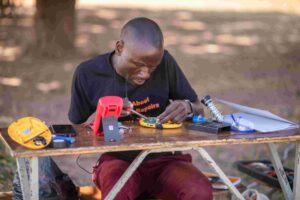Top three benefits:
- Reduce the environmental footprint of the company and help manufacturers comply with (new) regulations such as Extended Producer Responsibility (ERP).
- Improve customer satisfaction by offering repair and replacement beyond the warranty period, or selling refurbished items that are more affordable to customers.
- Create new income opportunities for sales agents or informal workers that are trained on repair and product collection.
Top three challenges:
- Consumer awareness on the impact of e-waste might be low.
- E-waste recovery can be costly and complex, with small margins, meaning the business case might be challenging.
- Repairing and refurbishing of e-waste requires technical skills and facilities (last mile distributors might want to partner with existing e-waste companies and only offer product collection and reverse logistics).

Photo credit: SolarAid/Jamiel Banda
Trailblazers:
- SolarAid (GDC member) is combating e-waste by creating repair manuals and training their agents in Zambia (read more).
- InnoNeat is a Kenyan startup that manufactures refurbished batteries for solar home systems.
- WEEE Centre in Kenya collects, repairs and refurbishes e-waste through a network of collection centres.
- In the REWMOS project, Solibrium Solar piloted a business model for electrical waste management and recycling of solar home system components.
- Let us know who else should be on this list
Resources:
- SolarAid’s repair app is freely downloadable on the Google Play Store for Android users.
- The MECS programme studied the opportunities and limitations of end-of-life management for appliances.
- GOGLA‘s e-waste toolkit helps off-grid solar companies to address the main challenges of e-waste management such as e-waste regulation and consumer awareness raising.

